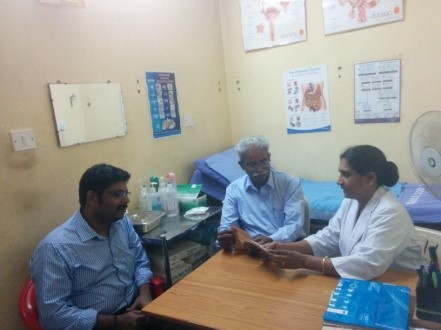Marking its origin somewhere around 18th century AD, stoma care has traversed many mile stones in its path before reaching the status of ‘true companion’ of patients with stoma. Still stoma surgery and stoma care remains a grey area among the common public. Living with stoma creates many challenges in terms of ‘Quality of Life’ Even among many who have an idea; it is often accompanied with stigmatised and sceptical views. It is therefore necessary to have a better understanding on stoma surgery and stoma care to have an unclouded perspective of the subject.
Stoma is a surgically created abdominal opening for the elimination of body waste. There are three basic types of stomas – Colostomy, Ileostomy and Urostomy. A variety of conditions affecting the colon and urinary system may predispose to surgery involving the construction of a stoma. Ulcerative Colitis, Crohn’s disease, Familial Polyposis, Carcinoma of bowel and bladder, Diverticular disease, Intestinal obstruction, Anorectal anomalies and Trauma are some among these. It may be temporary or permanent. The stoma usually looks dark pink or red in colour and may be edematous immediately after surgery. There is no age bar for a surgery involving the construction of stoma. Because of this specific nursing care is needed according to the individual need. In case of children sensitive counselling and teaching of parents is another important aspect of care.

Patients undergoing stoma surgery have to stick to a lot of restrictions in their life style which may often turn out to be really frustrating for many. Many face physical, physiological, psychological, social and economic problems and may end up in total mental duress. Here comes the pivotal role of a stoma care nurse who is very well trained to support these patients and their families to cope up with their endless struggles of the new life after stoma surgery.
Stoma care nursing is the nursing specialization providing pre and postoperative counselling, stoma marking, training to practical aspects of stoma management and rehabilitation.
The role of stoma care nurse is really challenging and often stress full. Even though the health care settings change day by day, the social stigma associated with ostomy care still persist with the public. Stoma support groups and ostomy associations have helped to change the misconceptions to a great extent and their continuous efforts in this regard need to be acknowledged.
Being a speciality, health care professionals need continuous improvement of their knowledge and skill in stoma care to minimize and manage ostomy related complications viz. bleeding, skin excoriation, stoma prolapse, hernia, stenosis or obstruction.
The presence of stoma results in altered body image and self-concept which may lead to depression, psychosis and even fear of death. Effective communication has an important role to overcome the psychological issues and uncertainties experienced by the patient and their families. Sexual dysfunction may occur due to damage of tissues and nerves. Here lies the importance of sexual counselling. In counselling sessions open ended questions are significant to explore their concerns and beliefs. And it may help the patients and their spouse to regain their confidence and enjoy their sexual life.


Transition from hospital to home is also very crucial. Through continuous consultation and support from stoma care team stoma patients can resume their dietary pattern, social activities, hobbies, employment, social and personal relationships. Even though stoma care is a team work, Nurses have a significant role to improve the day-to-day life of stoma patients, through effective counselling and empathetic nursing care. Stoma care nurses help them to enhance the Quality of Life with acceptance and appreciation and the smile of gratitude on the patient’s face says it all.
About the Author
Sr Geetha B S